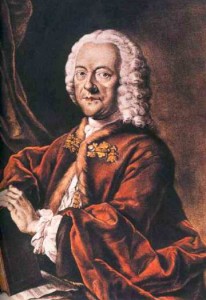Telemann, Overture “Burlesque de Quixotte”

I have been occupied with Bach in the past few weeks, preparing our new Composer of the Month series. At the same time, I revisited the music of Georg Philipp Telemann (1681-1767). The two had a lot in common. But one thing about Telemann kept coming to my attention: his sense of humor.
Bach probably had a sense of humor, too. (How else could you survive 20 children?) But Bach is more likely to exhibit cleverness in his music than raw humor.
The two men knew each other. Telemann was Godfather to Bach’s son Carl Philipp Emanuel. They both served as church musicians in Germany and came from the same region (Thuringia). But their professional backgrounds were quite different. Bach came from a musical family; he learned and carried on the family trade. Telemann had no musical ancestors. His mother discouraged his musical interests (actually taking away his instruments) so that he could get back on track to become either a lawyer or clergyman.
When Telemann went to Leipzig in 1701 to study law, his musical talents were quickly discovered and exploited. The mayor commissioned him to write a cantata every other week to be performed in the Thomaskirche (Bach’s future employer).
Telemann came to music as an amateur and retained a strong interest in creating music suitable for amateurs and for music-making in the home. His concertos, for example, eschewed the virtuosity of his contemporaries.
As a church musician, Telemann wrote sacred music. But he rejected the expectation that he confine himself to church music. He wrote for numerous genres, including opera, and helped establish the new phenomenon of public concerts. In later years (he survived Bach by 17 years) he helped to usher in the new galant style, a distinct departure from Baroque counterpoint. His works show French and Italian influences as well as folk tunes and Polish pop music.
Telemann based the suite featured here on his 1761 opera Don Quixote der Löwenritter. The comic elements of Don Quixote show up throughout. This performance takes the comedy to an extreme, perhaps a bit over the top. The score does not include percussion or indicate some of the zanier elements of this performance, but scores were not so explicit at the time. And, after all, Telemann labeled it a “burlesque,” a term derived from the Italian word burla and meaning joke, ridicule, or mockery.



